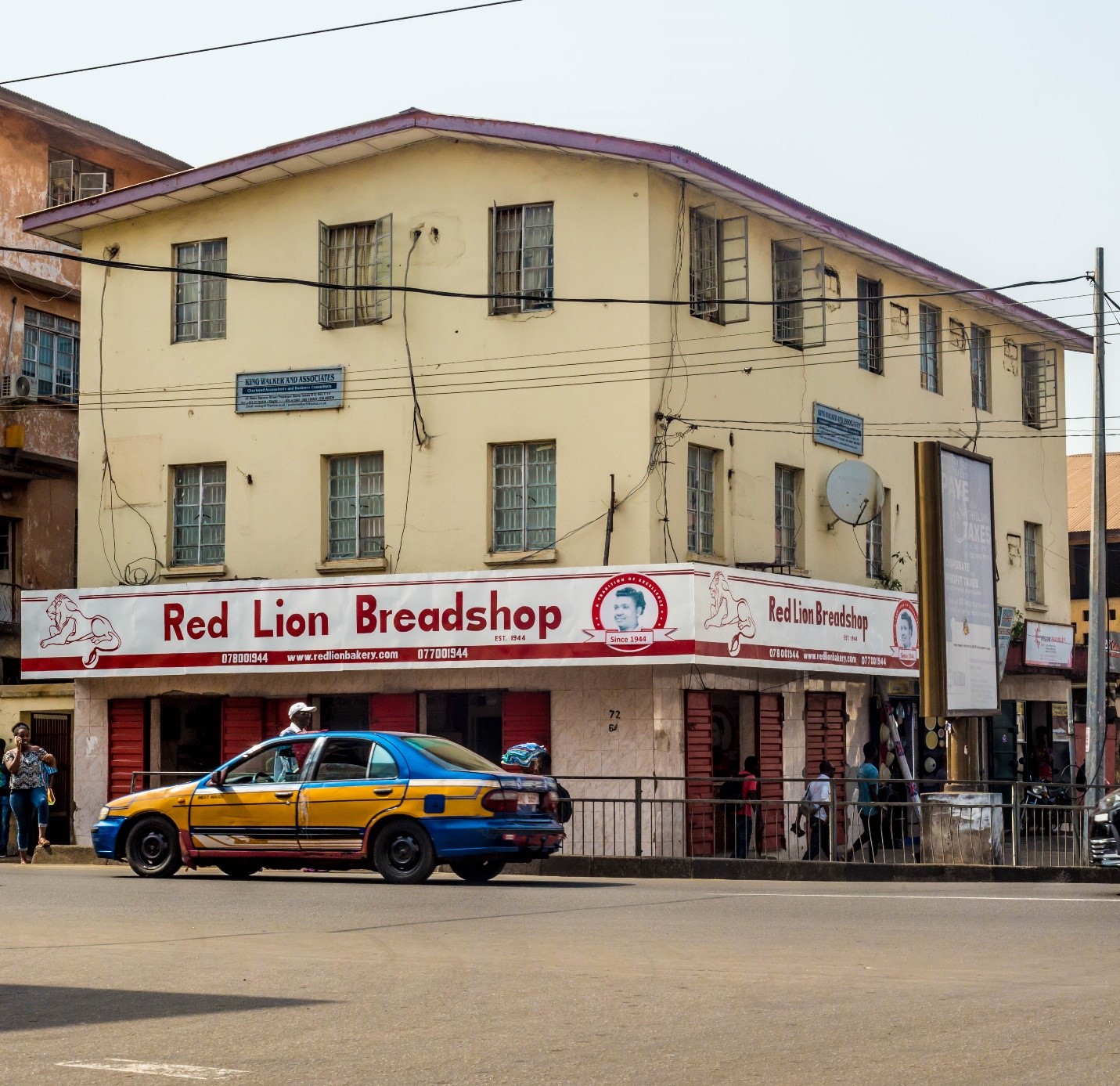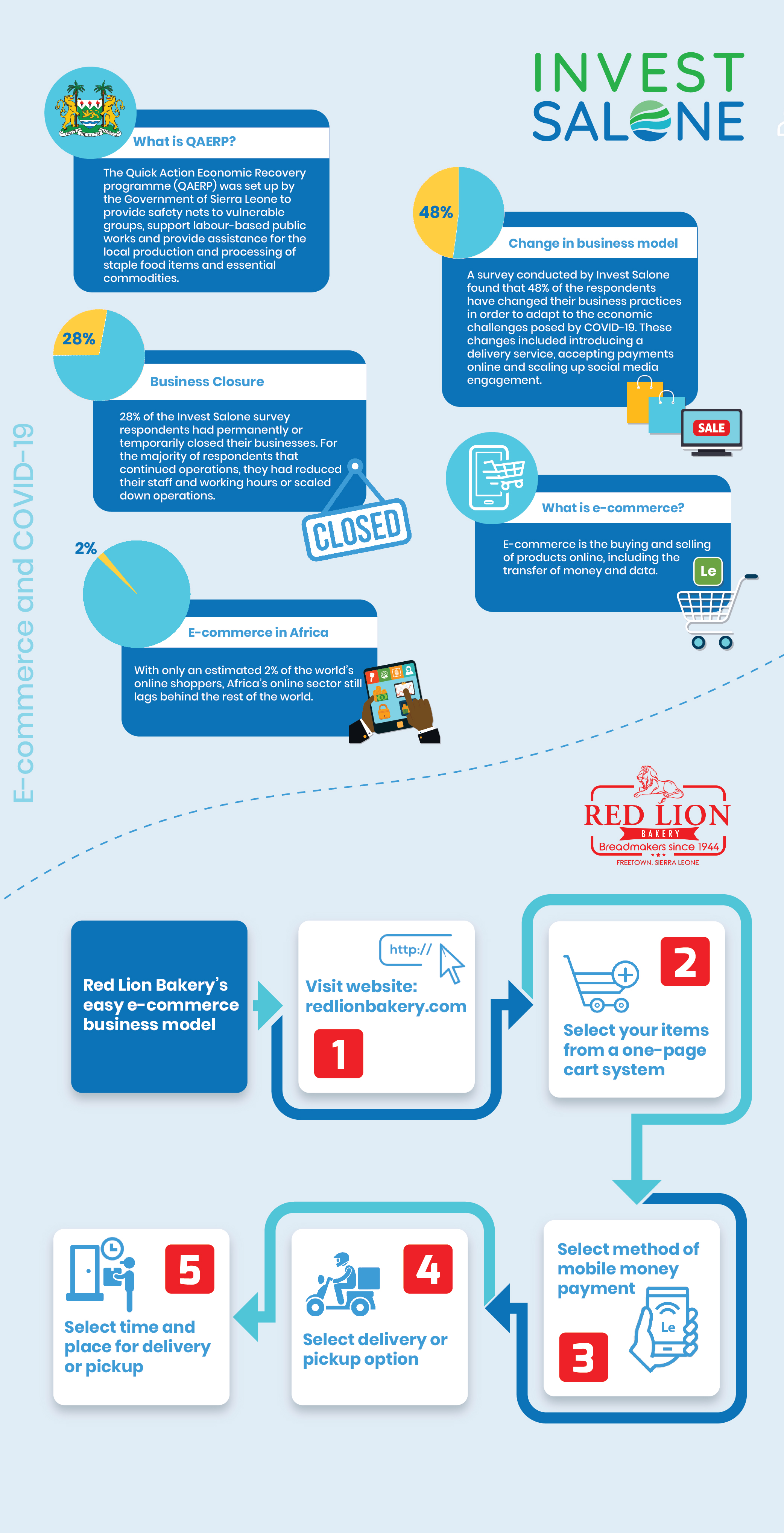
It’s six in the morning and the staff of Red Lion Bakery in Freetown, Sierra Leone are packaging orders made online the day before, for delivery or collection. The introduction of the bakery’s new online sales platform has been just what the business needed to survive the impact of COVID-19.
E-commerce is already the fastest growing segment of the retail market in Europe and North America, and restrictions in response to the COVID-19 pandemic, such as social distancing and lockdowns, have given it an unexpected boost as businesses look for new ways to supply goods and services to their clients.
Online sales in Europe are expected to reach £384.5 billion by the end of 2020, a staggering growth of 31.1% since last year1, while total U.S. online sales reached $73.2 billion in June year over year, up 76.2% from a year earlier2. With only an estimated 2% of the world’s online shoppers, Africa’s online sector still lags behind the rest of the world3. Nevertheless, it is growing at a faster rate than the world average and there are signs that the impact of COVID-19 on the sector will be felt for some time to come, both through increased online activity and by generating much-needed recognition for the sector’s added value.

In Nigeria, the online giant Jumia reported skyrocketing orders during the country’s three-month lockdown. DHL’s Africa eShop has been a valuable resource for its customers, with the company’s CEO pointing to impressive growth in countries like Nigeria, Ghana, Rwanda, Angola, Uganda and Kenya during the various stages of lockdowns. In Senegal, the Ministry of Trade and SMEs is partnering with the private sector to facilitate delivery of essential goods and services through e-commerce. In Uganda, the Ministry of ICT has made a call to develop digital solutions that will support health systems and public service delivery in the fight against COVID-19.
The online shopping sector in Sierra Leone is still in its infancy. Its UNCTAD B2C E-commerce index places it at 143 out of 151 countries based on four indicators:
- Percentage of population aged 15+ owning an account at a financial institution or with a mobile-money-service provider (Source: World Bank)
- Percentage of population using the internet (Source: International Telecommunication Union)
- Postal Reliability Index (Source: Universal Postal Union)
- Secure internet servers per 1 million people (Source: Netcraft)4.
Some of the country’s earliest innovators include Visit Sierra Leone, the local tour operator, whose clientele and services make an online presence essential; and Track Your Build, which offers project management and construction services to a tech-savvy client base. Recent entrants to the sector are the ride hailing apps Flash Motors and taptap.
The challenges of retail sales during the COVID-19 pandemic, however, have brought a new crop of businesses into the sector.
One of these is Freetown-based Red Lion Bakery.
To survive the lockdown measures introduced to control the spread of COVID-19 in Freetown, the 70-year-old family business became the first bakery in Sierra Leone to introduce online sales. Instead of laying off staff like so many other businesses, it hired five new staff members to handle the increased orders generated, including someone to help package the bread for delivery.
Government restrictions on large public gatherings negatively affected the bakery’s bulk orders. Red Lion also lost customers by insisting that all visitors to its shops adhere to safeguarding measures such as social distancing and mask wearing. Online sales, on the other hand, proved immediately popular. As Michelle V. Jones, Co-owner and Managing Partner of Red Lion Bakery, explains: “The situation had a negative impact on special orders for events like weddings and parties, funerals as well, but we have also realised an increase in sales of bread because of our new online order and delivery service.”
To make it easier to pay online, Red Lion accepts all of the main mobile money services – Africell Money, Orange Money and Rokel Simkorpor. Recognising, however, that this might limit sales by deterring customers who are unused to paying electronically, Red Lion also allows customers to pay cash on delivery.
Most of the bakery’s online business has come from repeat customers, but Michelle believes that it has the potential to grow as people become more comfortable pre-ordering and paying online.
Red Lion’s target audience and urban location have allowed the company to sidestep some of the other challenges of online retailing in Sierra Leone. For example, the bakery’s professional and middle-class customers are internet savvy, and because delivery is outsourced to a local delivery service – Unimak – there is no need to make use of the country’s postal system. Smartphone adoption and growing internet penetration is fuelling the expansion of e-commerce in Africa, but for online sales to really take off, issues around financial inclusion and last mile delivery will need to be addressed. It remains to be seen whether the lessons of the COVID-19 pandemic will encourage more businesses to introduce online shopping, and whether countries across Africa will invest in the infrastructure and policies necessary to facilitate e-commerce.
[1] https://www.retailresearch.org/online-retail.html [2] https://www.americanexpress.com/en-us/business/trends-and-insights/articles/how-your-business-can-benefit-from-the-changed-online-retail-landscape/ [3] https://unctad.org/en/PublicationsLibrary/tn_unctad_ict4d12_en.pdf [4] https://unctad.org/en/PublicationsLibrary/tn_unctad_ict4d12_en.pdf
The opinions expressed in this article are those of the authors and do not necessarily represent the views of UK aid and the programme partners.
